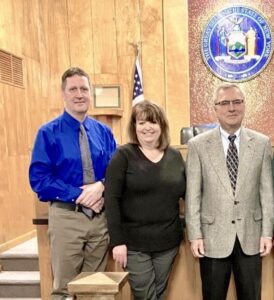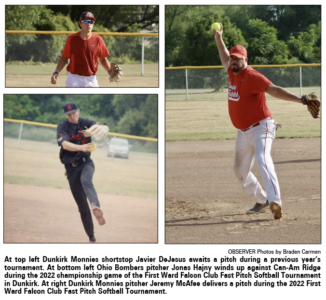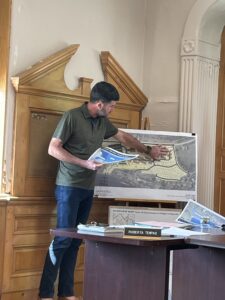Miss America 2019 shares music, experience at SUNY Fredonia

Photo courtesy Lori Deemer/State University of New York at Fredonia Dr. Rob Deemer, professor of composition, led a Q&A session with Franklin, following her lecture in the Williams Center.
SUNY Fredonia students and community members recently enjoyed the rare opportunity to meet with and learn from an innovative composer and classically-trained opera singer, who also happens to be Miss America 2019. On Tuesday, Nia Imani Franklin led a master class and gave a lecture on campus to share her work as a composer and her journey to the crown.
A native of Winston-Salem, N.C., Franklin has an undergraduate degree in Music Composition from East Carolina University and a master’s degree in Music Composition from the University of North Carolina School of the Arts. While in graduate school, Franklin got involved in the Miss America program as a way to earn scholarship money for her education, especially in light of her father’s job loss due to his battle with non-Hodgkin lymphoma.
In her lecture on Tuesday, Franklin chronicled her challenging journey to becoming Miss America. After two unsuccessful years of vying for Miss North Carolina, Franklin made the move to New York City, where she was awarded a Kenan Fellowship at New York’s Lincoln Center for the Performing Arts. By that time, she had aged out of the competition and instead focused on her fellowship and freelance composing.
After learning that the age limit had been raised, Franklin was still reluctant to compete. “In 2018, I came home to premiere a commissioned piece for double bass and oboe,” Franklin explained. “My mom encouraged me to compete in New York. I thought, ‘What do I have to lose? I’m going to give it one more shot.'”
Franklin then drove to Cortland, New York where she participated in the last local competition of the year. “Low and behold, I won Miss Five Boroughs,” said Franklin. “In June I traveled to Buffalo for Miss New York, and I won! I couldn’t believe I had almost given up. Having that faith in yourself is so important. Try one more time, no matter how difficult things may seem.”

Photo courtesy Lori Deemer/State University of New York at Fredonia Nia Franklin with composition student Sierra Wojtczack
Franklin and Dr. Rob Deemer, coordinator of the Music Composition area in the School of Music, sat down with the OBSERVER on Tuesday afternoon to talk about the field of composition, the importance of arts education and Franklin’s next chapter now that her reign as Miss America has come to an end.
OBSERVER: Share your journey to becoming a vocalist and a composer.
Franklin: My journey to music is not all that special. I got my start in the church, like many singers, and that gave me a foundation. It’s always been my dream to be a singer, and when I was little, I always loved writing songs. I had some piano instruction, but mostly I taught myself how to play the piano. I got involved in chorus and band in middle school. In my sophomore year in high school, I came across a documentary about “Shrek: The Musical,” and there was a woman in the documentary behind the scenes who was composing, and that opened my eyes to the possibility for me. That’s when I started taking a look at the classical music world and what it would take to get into that world. I did my first composition when I was in high school. It was not very good at all, but somehow good enough to get me into a program at East Carolina University, and that’s where I really got my training in composition.
OBSERVER: What does the field look like right now for female composers and composers of color?
Deemer: It’s improved greatly over the last two or three years. I think folks are discovering that there are a lot of talented composers from under-represented groups that they just didn’t know about. It’s not that they weren’t there, it’s just that no one knew who they were. They had a lot of barriers to getting to the point where people would know who they are, and those barriers are slowly coming down.
Franklin: I can’t count on even one hand how many people who look like me I’ve come across during my now almost 10 years of being in this world. I started my undergraduate schooling in 2011, and over the last 10 years, I’ve rarely seen people of color who are women or even men in the composition world. We were that but just not seen that often. I feel that I have a responsibility to show others that they can do it, too, and just to be visible.
OBSERVER: How did that responsibility fit into your platform of promoting arts education as Miss America last year?
Franklin: In my master’s program, I was a member of ArtistsCorps and their whole mission was to integrate art into a child’s education, to expose them to education and to also educate them on what the arts could do. There were several under-represented youth in my community who had no access to the arts in their schools, so our job was to supplement that by going in and teaching music so they could have that exposure. It really opened my eyes to the blessings and advantages that I had growing up. … It made me think about how we need to be educating people and helping them see that music — the arts — can really help them in life. For me, it definitely pushed me to be better in all my academics. That’s where that platform developed for me as Miss America: I focused on doing that same thing by bringing the arts to students and speaking on the importance of arts education.
OBSERVER: At what age do you believe it’s important for students to be exposed to the arts?
Franklin: I think as young as possible. I was working with preschoolers that had no access to music in their preschool program. Even just having a preschool to go to is big for them. It was actually through my church that has a preschool program, and it’s affordable. The parents are just happy to have somewhere for their children to go while they’re at work. They’re not worried about music — that’s almost like a luxury to them. But it really shouldn’t be looked at as a luxury; it should be looked at as a necessity that is something that everyone has a right to. I think we think of music as performing or singing, but there’s also composition, which a lot of people don’t even really know what that means. Through my initiative, Compose Her, I’ve had a chance to do a workshop through a partnership with Los Angeles Opera where I taught students ages 14 to 17 about composition. I think it’s important to expose them to that as young as possible.
OBSERVER: Dr. Deemer, in your experience and in your role at SUNY Fredonia, how prepared are students for composition?
Deemer: I know that from my experience, many students are not exposed to composing or don’t even get the chance to try it out until mid-high school or even late high school. Oftentimes here, we’ll accept someone who may have only been doing it for a year, but I can tell by having talked with them and seen their music, they have the innate skills that you need and the creativity, but they just don’t have the portfolio or the experience. Sometimes we get folks who have been doing it since they were in elementary school. It is a challenge for music education in general that composition is not a big part of the music education curriculum. Here, we’ve done a good job of integrating that into our teacher prep curriculum. Our music education faculty are all thinking about that and trying to give students as much experience as they can. … Folks like Nia are bringing exposure to that and showing that you don’t have to be Mozart to become a composer.
OBSERVER: As you’ve toured the country over the past year, you’ve probably heard discussions of budget issues and the arts. What can schools do to provide opportunities in the arts even if there is a serious lack of funding?
Franklin: The most immediate thing you can do is to reach out to local non-profits in your area that offer teaching artist programs, such as ArtistCorps or in New York City, the Brooklyn Academy of Music or Lincoln Center. Additionally, you can reach out to the people that work in the government for your state. It’s important to be an advocate for that and support the groups that are trying to do good work in that area.
OBSERVER: What are some of the most important soft skills that students can gain from arts education, especially those students who may not pursue a career in the arts?
Franklin: Teamwork! Being in an ensemble or a band, you have to learn how to work together. You have to be a really good listener. You have to listen to what’s going on around you, musically, but you also have to be able to listen to the conductor and your teachers. I would definitely say that as a composer, I have learned how to collaborate. Unless you play every instrument in the world and can play a violin, a viola and a cello at the same time, there’s no way that you can bring your music to life without the help of others. You really have to be a strong collaborator and be able to communicate and negotiate, as well.
OBSERVER: Dr. Deemer, what does it mean to you and your students to be able to have Ms. Franklin here?
Deemer: It means a lot. When she was first crowned Miss America over a year ago, everyone was talking about it. Not only is she a musician, but a composer! Does that ever happen? Over the course of the year with my work with the Institute for Composer Diversity and Nia’s work with Compose Her, we started to connect on social media, and I found out that she knew about Fredonia. It was so amazing that the student-led Ethos New Music Society, when I suggested Nia to them as a potential relatively-late addition to our season of guests, jumped on it right away. Also, President Dennis Hefner and Vice President for Student Affairs Cedric Howard were also really great in getting us funding support to be able to make this happen relatively short notice. Part of the reason why I like to bring in guest artists and composers, especially ones that the students may have heard of, is that they learn that they’re real people, too. … It allows for students to be able to see themselves in a slightly different way and see the world in a slightly different way than just the famous people are on the stage and they’re not. That distance never really allows them to be able to imagine themselves doing something at that level.
OBSERVER: Ms. Franklin, what do you enjoy about working with college students, whose shoes you were in not so long ago?
Franklin: I haven’t done anything quite like this where it’s been in a large group setting. I’ve mainly done one-on-one mentorship and things of that nature, so this will be a first. I hope to continue doing this at the university level. I think it’s important. I remember being in their seats about eight years ago, and it’s important to have these people up close and personal. It’s an encouragement. I’m excited to work with them, speak with them and see what they do next. A lot of them are going to be out in the field pretty soon, and a lot of them are already doing amazing things already.
OBSERVER: Over the past year, you’ve had the opportunity to share so much with the students you’ve interacted with. What are some lessons you’ve learned from them?
Franklin: I think the biggest thing I learned is that students really want someone to be there to listen, to help them grown and communicate. I think a lot of the students that I’ve met have just taught me that it truly is a cycle as far as giving back and mentoring other people. I’ve had people that have mentored me throughout the past year and still do. I think that’s really a basic human need: Being there for people and not writing people off. That’s something I want to remember. So many times, people forget where they may have come from. No matter how far I go or what I do, I’ll remember to stop and listen to people, share advice, and be a helping hand.
OBSERVER: Any interest in teaching?
Franklin: I’ve thought about it, but not right now. I’m still learning a lot, myself, so I’m not sure I’ll go into teaching on a collegiate level. It could be fun! One of my heroes is Maya Angelou and she was actually a professor in my hometown for many years — at Wake Forest University — up until she passed. She was teaching in their literature department, and I think that’s incredible. I think it’s a huge responsibility being an educator, and I would want to make sure I’m completely prepared and ready for that. It’s more than ‘book smarts.’ Being a teacher comes with a certain amount of wisdom, and I’m not sure I’m ready for that.
OBSERVER: What does the future look like now that your year as Miss America has come to an end?
Franklin: I feel like 2020 is the year of possibility for me, branching out in different directions that I really didn’t necessarily see myself in. I’m doing ‘The King and I in March’ in North Carolina with the Piedmont Opera. I’ll be playing the role of Tuptim; it’s not something that I thought would happen for me at this point in my career. I’m still traveling quite a bit. I’ll be doing things like this, performing, festivals. I just released a new song “EarthSun,” which is available on Spotify (Nia Imani). I’m working on an EP album as well, so I’m just really trying to take advantage of all these opportunities that I’m being presented with.
- Photo courtesy Lori Deemer/State University of New York at Fredonia Dr. Rob Deemer, professor of composition, led a Q&A session with Franklin, following her lecture in the Williams Center.
- Photo courtesy Lori Deemer/State University of New York at Fredonia Nia Franklin with composition student Sierra Wojtczack








